- Home
- David Gemmell
Fall of Kings Page 33
Fall of Kings Read online
Page 33
Agamemnon had gone pale, and his dark eyes were angry.
“I, too, would like to hear why we should commit more of our forces to certain death,” Menestheos of Athens put in mildly.
Agamemnon took a deep breath. He explained, “Yesterday a group of my warriors managed to take a part of the wall and hold it for a short while before being thrown back by the renegade Banokles and his men. If a brave troop of soldiers could take and hold just a section of the wall, then we could send hundreds up a ladder behind them. The Trojans would not be able to stop them. But we need the bravest of fighters, willing to risk their lives for our just cause.”
He looked around the room, and his eyes rested on Achilles.
“I will have nothing to do with this insanity,” the king of Thessaly said. “I and my Myrmidons will take part in no more suicidal attacks on the walls.”
“So,” Agamemnon said icily, “our champion Achilles fears—”
Achilles rose to his feet and in one swift stride was in front of Agamemnon, the tip of his sword resting lightly on the Mykene’s throat. It was done so quickly, so gracefully, that no one had time to move. Odysseus saw Patroklos lay his hand on his sword hilt, as did Agamemnon’s two Followers. There was a deathly silence in the megaron.
Agamemnon, staring unblinking into Achilles’ eyes, continued. “I was going to say that Achilles fears for the lives of his men. This is understandable and is the mark of a true captain. The valiant Myrmidons have been vital to our success so far.”
Achilles paused for a moment, then sheathed his sword. Without taking his eyes off Agamemnon, he returned to his seat.
“We are all men of honor,” Agamemnon went on. “Achilles is our champion, and none doubts his countrymen’s bravery. But our attack will go ahead without Thessaly if it must.”
“And without Ithaka,” Odysseus put in. “My men will not be climbing walls to certain death. You can have my archers and my bow Akilina to defend your warriors from the ground; that is all.”
“So be it,” Agamemnon said coldly. “And what is your plan for taking the walls, Tale Spinner? Or are you only here to weave children’s stories about magic pigs and flying ships?”
Black-bearded Meriones stood up and said angrily, “The king of Ithaka has proved himself in battle a hundred times. If it were not for him, we would still be languishing on the other side of the Scamander.”
“Yes, yes,” old Nestor put in impatiently. “We are all warriors here. I had fought a hundred battles before young Achilles was a gleam in his father’s eye. What I would know, Agamemnon King, is why you need us all here when you plan to send one troop of your men up a ladder.”
“The attack will be the same as yesterday’s,” the Battle King replied patiently. “With all our ladders and as many men as we can muster. The Trojans must not know where our eye is fixed.”
“And where is it fixed?” the king of Pylos asked.
“Our target is the south wall beside the Great Tower of Ilion. If we can take and hold that small part of the wall, we will have access to the great tower through the battlements door. Then we will have two ways in: down the steps at the south wall or down through the tower, which, as you all know, opens behind the Scaean Gate. We need get only six men to the gate and the city is ours.”
Odysseus waited a safe distance from the south wall, the great bow Akilina on his shoulder, as the western troops mustered for the new assault. This was to be no surprise attack. He could see the sun glinting off the helms of the Trojan forces lined up along the top of the wall.
Despite his losses, Agamemnon could gather more than thirty thousand warriors for the assault. The Ithakan king calculated that there could be no more than five thousand soldiers left inside the walls to defend Troy. That should be plenty today, he thought. Agamemnon’s latest scheme might work, but that was unlikely. Each passing day, each failed assault, confirmed Odysseus in his belief that the only way to take the city was by trickery.
The ladders lay lined up on the ground. They were constructed of oak from the foothills of Mount Ida and lashed together with strong leather strips. They were heavy, and each required six men to raise it to the walls.
The command was given, and the attackers picked up their ladders and ran with them to the base of the wall. Within moments, scores of ladders had been raised and armored warriors were streaming up them. Odysseus stepped back a few paces, notched an arrow to the string, and waited, just as the defenders waited. The Trojans were waiting for each ladder to be charged with warriors before dislodging it from the wall. Odysseus was waiting for the defenders to lean out from the battlements to shift the ladders.
A bearded Trojan soldier holding a ladder pole stretched out from the top of the wall to hook the pole against a ladder and thrust it sideways. Odysseus could see a tiny patch of white between his helm and the armor at his neck. He sighted Akilina and loosed. The arrow punched through the man’s throat, and he slumped over the wall. Odysseus notched another arrow to the string and waited.
The ladder beside the great tower was downed quickly by the defenders, the warriors falling from it as it crashed to the ground. More soldiers raced to raise it again and to climb it regardless of the danger to themselves. Agamemnon had promised honor and a sheep’s weight in gold to the first man to reach the battlements and live. Odysseus picked off two more defenders at the top of the ladder. He saw a soldier on the wall spot him and point him out to the Phrygian archers. Odysseus grinned. He was well out of range of their puny bows.
The attackers were making a fourth attempt to climb the ladder by the tower. There were seven warriors on it when it was pushed sideways, dislodging the men clinging to it and those on the next two ladders as it crashed into them. There was a thin sound of cheering from the top of the walls.
But the attackers did not hesitate. New soldiers leaped forward and raised the ladders again. Such courage wasted on a doomed venture, Odysseus thought.
Glancing at the top of the wall again, he suddenly realized that the defenders had fallen back. He frowned. What are they up to now? he wondered.
All along the south wall he saw men come into view bearing huge shallow dishes of shining metal in cloth-covered hands. Boiling oil, Odysseus wondered, or scalding water? The dishes were tipped up as one, and their contents showered down on the invaders below.
Instantly there was a scene of horror as climbing men all along the wall started screaming and writhing, trying to pull off their armor, and falling from the ladders. Those who managed to get out of their armor continued shrieking in torment, their cries hideous to hear.
Odysseus shouldered Akilina and ran toward the walls, shouting at his archers to carry on shooting at the defenders.
He reached a Mykene warrior who was writhing in agony, trying desperately to rid himself of his breastplate. Odysseus tore it off him, but that did not help. The man went on screaming as Odysseus ripped off his tunic.
“What is it, Odysseus? What’s happening to them?” Meriones cried, kneeling at his side.
The fallen warrior had fainted from the excruciating pain, and Odysseus pointed at the bright red skin of his chest and shoulders. It looked as if it were boiling.
“Sand,” he said, “mixed with tiny shavings of metal and heated until it’s red-hot. It sifts under the armor and burns deeply into the skin. It can never be removed and will always be a torment to the victim. I have heard of this weapon used in desert lands. It is a fiendish torture.”
An arrow thudded into the ground beside him, and he and Meriones swiftly raised their shields above their heads. Then each took an arm of the wounded soldier, and they started to drag him away from the walls. But another arrow slammed into the man’s chest, and he died instantly. They let go of him and turned back to the walls to try to rescue others.
“By Apollo’s balls,” Odysseus muttered, “he’s better off dead.”
Between them, he and Meriones carried several soldiers, all tormented by unendurable pain, away from the w
alls. Never had the king felt so helpless in the face of hideous injury.
They’re all better off dead, he thought grimly.
CHAPTER TWENTY-FOUR
WITH SHAFT AND BOW
The warm spring turned into a hot, dry summer. The besieged city was parched.
As Andromache walked from the House of Serpents back to Hektor’s palace, she thought longingly of the cool goblet of water that would greet her when she arrived. She slipped through the gates of the palace, shedding her bodyguards with a nod, and stepped into the gardens.
The plants were dying. The tender ones were long dead; the pots and troughs fashioned from stone and wood were filled only with brown twigs. Even the trees were drooping from lack of water. In the early evening light, Andromache’s two boys were running around on the dry cracked earth, playing catch, unaware of the dead plants and the city’s desperate plight.
“Mama!” Astyanax shouted joyfully, and ran to her with his arms out. She lifted the boy up onto her hip with a groan. “You’re getting too heavy for me!” she protested. Dex ran up to her, too, and she ruffled his fair hair, smiling down into his dark eyes.
He was a thoughtful little boy, still shadowed by grief. Sometimes at night, when he was afraid to sleep because of nightmares, he would creep into her bed and whisper to Andromache about his mother, whom he called Sun Woman, and Gray One and Old Red Man. She had learned that Gray One had been his elderly nurse, and Old Red Man the Dardanian general Pausanius, both killed in the Mykene attack on Dardanos. The little boy would chatter about them, mixing them up with stories of gods and goddesses he had been told. He recited the same tales over and over, comforting himself with their familiarity. One night recently he had brought “Mama” into his stories. She recognized herself, and her heart lifted. He was starting to add his present life here in Troy to his past life with the dead of Dardanos. He was still heart-scarred, but she believed the boy eventually would heal.
She put Astyanax down and, taking both boys by the hand, led them into the palace. She passed through the anteroom and found her handmaids Penthesileia and Anio talking together in whispering voices. They blushed when she appeared and made a show of looking busy, polishing the heavy gold jewelry once worn by Laodike, now left unused in a carved ivory box. Andromache smiled at the two girls and walked out to the pleasantly shady terrace.
Axa bustled about, bringing the boys sweet cakes and milk. She handed Andromache a goblet of water, and the princess drank it down gratefully. The taste was sublime. “I have put a basin of water in your chamber if you want to wash,” the maid said.
Andromache looked at her sternly. “I’ve told you, Axa, that we cannot waste water on washing. I do not expect you to wash, or the boys, or your babies.” Before the fall of the lower town, Axa’s three small children had been moved into the palace.
“But lady, Prince Polites has asked you to meet him and the generals tonight. You will want to wash before you change your dress,” the maid said pointedly.
Andromache looked down at her saffron gown, which was stained from her day working with the sick and wounded in the healing house. “Why would I get changed?” she asked. “I have nothing clean to wear.”
“I have ordered six white gowns for you,” Axa told her. “The dyemakers cannot work, but the seamstresses can. And it gives them something to do,” she added defensively.
“But white cloth is needed for bandages.”
Axa shook her head vigorously. “I asked Zeotos, and he said since there are few injured these days, he has enough bandages stored away to last for ten years.”
Andromache laughed. “Then you are right, Axa,” she admitted. “There is no reason why we shouldn’t have clean white dresses. Order some for yourself and for Penthesileia and Anio. But you must still pour that water back into the water barrel for drinking.”
“But I have already perfumed it, lady,” her maid replied stubbornly. “No one can drink it now.”
“Then give it to the horses. They won’t mind the taste of rose petals.”
“But—”
“Now, Axa. The horses will be grateful.”
Axa fetched the basin, grumbling to herself, then left the apartments. Andromache walked across the terrace, which overlooked the stables in the Street of Bright Dancers, and looked down. Eventually she saw the plump figure of her maid walking from the palace, the water basin cradled in her arms. The woman paused and looked up. Andromache waved at her. Axa walked on into the stables.
Smiling, Andromache threw herself down on a couch. Strange days, she thought. There was a listless stillness in the city she never had known before. The heat lay like a wool blanket, stifling movement and keeping everyone indoors in the shade. The streets were empty except in the evenings, when weary people lined up for bread and water. No one had enough water or enough to eat.
Although they all lived under the daily threat of death, Andromache felt strangely content. Her husband and her lover were both away at war, and she no longer felt the exhausting conflict of desires and responsibility. Her choice had been made. She would stay with her son and with Dex until the end came and the blood-hungry soldiers poured in and then protect the boys with her life.
Each day she worked in the House of Serpents. It was more than fifty days since the last major attack by the armies of Agamemnon, and the only injuries now were arrow wounds and broken limbs sustained when soldiers who had received their wine ration tumbled off the walls. The work at the healing houses was not hard. Xander had disappeared mysteriously, and Andromache wondered what had become of him, but most of the priests and healers had stayed. The dying were not fed and were given only enough water to moisten their mouths. Those thought likely to recover were given water until they complained of hunger, when they were fed as well. Andromache hated being in the palace all day, with its air of heavy anxiety, and preferred to keep herself busy working among the injured and dying, feeding them, talking to them, sometimes holding their hands until they died.
The truth was, she thought, no one had enough to do. The daily routines of the city had broken down because of the lack of supplies and exhaustion brought on by the shortage of food and water and the energy-sapping heat. Most people, when not standing in line for food, stayed home. Inactivity sparked gossip and fueled people’s fears. Her handmaids Penthesileia and Anio had too much time on their hands, she thought, and spent it discussing the plight of the city with other royal servants.
Her mind drifted back to the previous autumn and Kassandra’s words to the girls when she last had been in these rooms. “You must learn to shoot! The Women of the Horse with shaft and bow! You see? You see, Andromache?”
“Yes, Kassandra,” Andromache said to the empty room. “I see now.”
Polites was waiting in the megaron with Banokles and Kalliades when Andromache arrived. She smiled at the two warriors, the one blond-bearded and powerful, the other tall and dark. She always would remember them running down the hillside to her rescue on the night Kalliope died. Then they were Mykene rebels fighting assassins who had come to kill her. Now they were the most respected soldiers in the Trojan army. She had heard of the death of Banokles’ wife and was filled with sympathy, but the only time she had tried to raise the subject with him, he had ignored her and rudely walked away.
“I assume,” she said to Polites, sitting on a padded chair and folding her hands, “that we are to discuss rationing and the care of the wounded. You would not have asked me to a meeting of strategy.”
Polites sighed. “Our only strategy is staying alive. We have not been attacked for fifty-five days. The heat and lack of food and water are our worst enemies now. Our food will only barely last until the autumn. The wells may run dry any day.”
“Is that likely?” Kalliades asked.
“It has happened before.” General Lucan hurried into the megaron alongside the king’s aide Polydorus and Ipheus, the young commander of the Eagles. “Both wells ran dry in the summer heat some forty years ago,” he
explained. “The rivers were down to a trickle, too. It was a hard summer. All the livestock died. We had to slaughter most of the horses. I’ve never seen its like. But the rains came early that year, and we survived.”
“The enemy is suffering, too,” Kalliades put in. “They have water aplenty, but their food supplies are not getting through. We have Hektor and Helikaon to thank for that. Agamemnon’s armies have ravaged the countryside all around the city. There are no crops left, no livestock. And hungry soldiers are unhappy soldiers. We know one army of mercenaries departed ten days ago, heading south. Others will start defecting if they see no end to the war.”
“It is our best hope,” Polites said.
“No,” Banokles put in, scratching his beard, “our best hope is that Agamemnon and his bunch of poxy kings lay down their arms and surrender to us. But it’s not very likely.”
The men all smiled, but Andromache said impatiently, “What are we here to discuss, Polites? The situation at the House of Serpents is the same as it was before, when we met three days ago. Many old people and babies are being cared for now, suffering from the heat and drought. Ten more injured bowmen have been brought in. Two died. Three have infected wounds and are likely to die. The others will live, Zeotos says.”
Angrily, she added, “I don’t understand why our bowmen are being put in danger when we are not under attack. Taking potshots at the enemy below the walls achieves little. If each of our archers was to kill one enemy soldier every day, it would still be like a drop of water in the Great Green.”
“We need to remind the enemy, Sister,” Polites replied, “that Troy is stoutly defended. Each attack, even a single arrow shot over the battlements, has to be met with an answer from the city.”
Kalliades added gravely, “And if the city falls, lady, and the Scaean Gate is opened, then a few bowmen will not make a difference to our fortunes.”

 Bloodstone
Bloodstone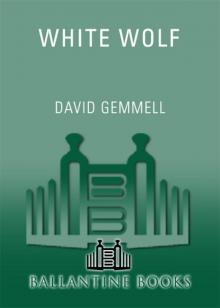 White Wolf
White Wolf Wolf in Shadow
Wolf in Shadow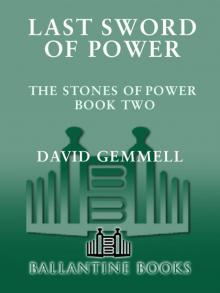 Last Sword of Power
Last Sword of Power Dark Moon
Dark Moon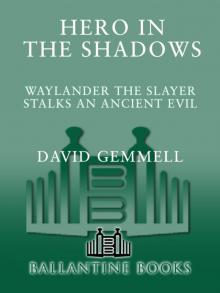 Hero in the Shadows
Hero in the Shadows Gemmell, David - Drenai 09 - Hero In The Shadows
Gemmell, David - Drenai 09 - Hero In The Shadows Waylander
Waylander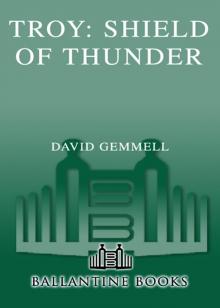 Shield of Thunder
Shield of Thunder Stormrider Stormrider
Stormrider Stormrider Ghost King
Ghost King Legend
Legend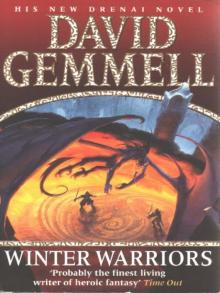 Winter Warriors
Winter Warriors Fall of Kings
Fall of Kings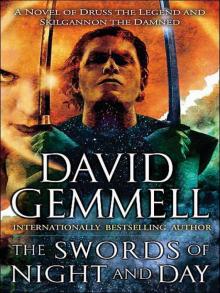 The Swords of Night and Day
The Swords of Night and Day The King Beyond the Gate
The King Beyond the Gate Midnight Falcon
Midnight Falcon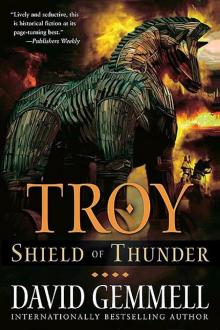 02 - Shield of Thunder
02 - Shield of Thunder In the Realm of the Wolf
In the Realm of the Wolf Ravenheart
Ravenheart The First Chronicles of Druss the Legend
The First Chronicles of Druss the Legend Last Guardian
Last Guardian Stormrider
Stormrider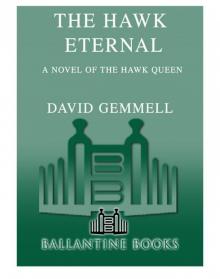 The Hawk Eternal
The Hawk Eternal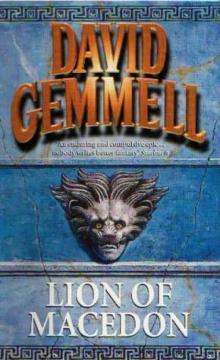 Lion of Macedon
Lion of Macedon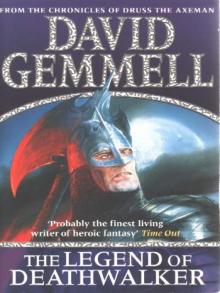 The Legend of Deathwalker
The Legend of Deathwalker Knights of Dark Renown
Knights of Dark Renown Echoes of the Great Song
Echoes of the Great Song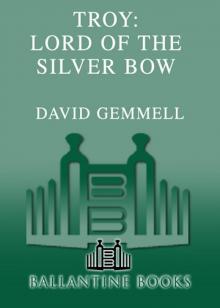 Lord of the Silver Bow
Lord of the Silver Bow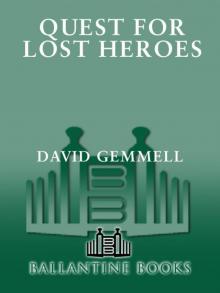 Quest for Lost Heroes
Quest for Lost Heroes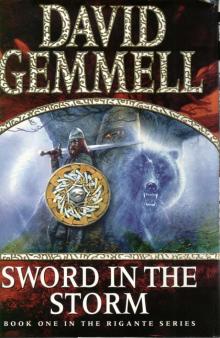 Sword in the Storm
Sword in the Storm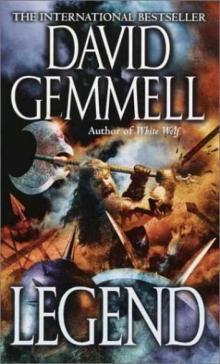 Drenai Saga 01 - Legend
Drenai Saga 01 - Legend White Knight/Black Swan
White Knight/Black Swan![[Troy 02] - Shield of Thunder Read online](http://i1.bookreadfree.com/i/03/19/troy_02_-_shield_of_thunder_preview.jpg) [Troy 02] - Shield of Thunder
[Troy 02] - Shield of Thunder Lord of the Silver Bow t-1
Lord of the Silver Bow t-1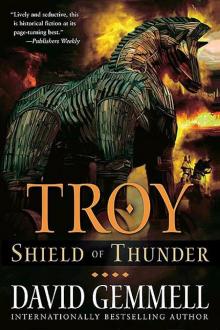 Shield of Thunder t-2
Shield of Thunder t-2 White Wolf: A Novel of Druss the Legend dt-10
White Wolf: A Novel of Druss the Legend dt-10 Drenai Saga 02 - The King Beyond the Gate
Drenai Saga 02 - The King Beyond the Gate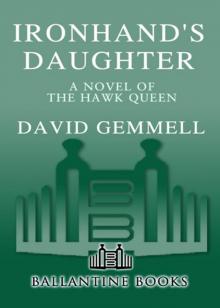 Ironhand's Daughter
Ironhand's Daughter Gemmell, David - Drenai 06 - The First Chronicles of Druss the Legend
Gemmell, David - Drenai 06 - The First Chronicles of Druss the Legend The Last Guardian
The Last Guardian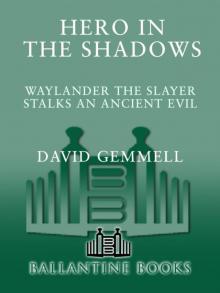 Hero in the Shadows: A Waylander the Slayer Novel
Hero in the Shadows: A Waylander the Slayer Novel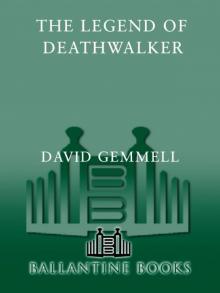 The Legend of the Deathwalker
The Legend of the Deathwalker